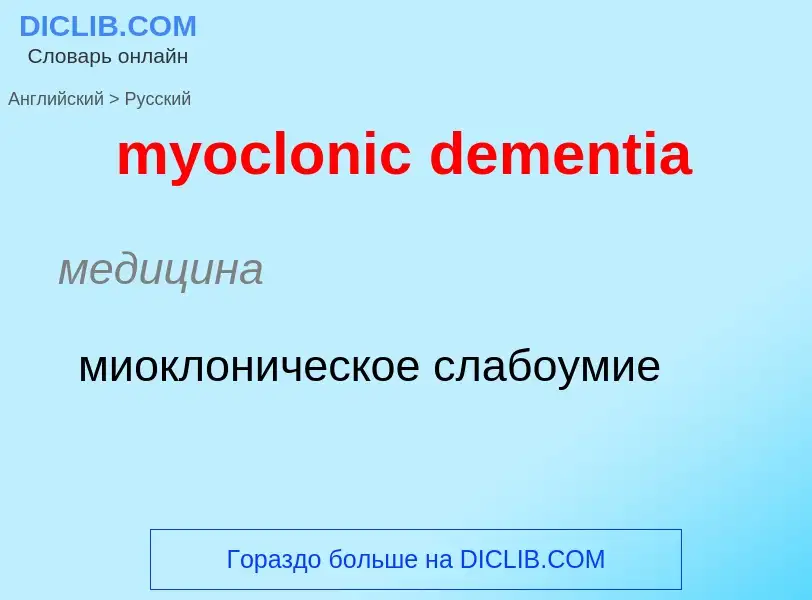Перевод и анализ слов искусственным интеллектом ChatGPT
На этой странице Вы можете получить подробный анализ слова или словосочетания, произведенный с помощью лучшей на сегодняшний день технологии искусственного интеллекта:
- как употребляется слово
- частота употребления
- используется оно чаще в устной или письменной речи
- варианты перевода слова
- примеры употребления (несколько фраз с переводом)
- этимология
myoclonic dementia - перевод на русский
медицина
миоклоническое слабоумие
[si'niliti]
общая лексика
старость
дряхлость
медицина
старческий возраст
одряхление
прилагательное
общая лексика
старость
дряхлость
существительное
общая лексика
глубокая старость
дряхлость
одряхление
угасание
Определение
Википедия
Myoclonus is a brief, involuntary, irregular (lacking rhythm) twitching of a muscle, a joint, or a group of muscles, different from clonus, which is rhythmic or regular. Myoclonus (myo "muscle", clonic "jerk") describes a medical sign and, generally, is not a diagnosis of a disease. These myoclonic twitches, jerks, or seizures are usually caused by sudden muscle contractions (positive myoclonus) or brief lapses of contraction (negative myoclonus). The most common circumstance under which they occur is while falling asleep (hypnic jerk). Myoclonic jerks occur in healthy people and are experienced occasionally by everyone. However, when they appear with more persistence and become more widespread they can be a sign of various neurological disorders. Hiccups are a kind of myoclonic jerk specifically affecting the diaphragm. When a spasm is caused by another person it is known as a provoked spasm. Shuddering attacks in babies fall in this category.
Myoclonic jerks may occur alone or in sequence, in a pattern or without pattern. They may occur infrequently or many times each minute. Most often, myoclonus is one of several signs in a wide variety of nervous system disorders such as multiple sclerosis, Parkinson's disease, dystonia, cerebral palsy, Alzheimer's disease, Gaucher's disease, subacute sclerosing panencephalitis, Creutzfeldt–Jakob disease (CJD), serotonin toxicity, some cases of Huntington's disease, some forms of epilepsy, and occasionally in intracranial hypotension.
In almost all instances in which myoclonus is caused by central nervous system disease it is preceded by other symptoms; for instance, in CJD it is generally a late-stage clinical feature that appears after the patient has already started to exhibit gross neurological deficits.
Anatomically, myoclonus may originate from lesions of the cortex, subcortex or spinal cord. The presence of myoclonus above the foramen magnum effectively excludes spinal myoclonus; further localisation relies on further investigation with electromyography (EMG) and electroencephalography (EEG).



![Brain [[atrophy]] in severe Alzheimer's Brain [[atrophy]] in severe Alzheimer's](https://commons.wikimedia.org/wiki/Special:FilePath/Alzheimers brain.jpg?width=200)

![Woman with dementia being cared for at home in [[Ethiopia]] Woman with dementia being cared for at home in [[Ethiopia]]](https://commons.wikimedia.org/wiki/Special:FilePath/Care at Home with Dementia, Tigray (8015180561).jpg?width=200)
